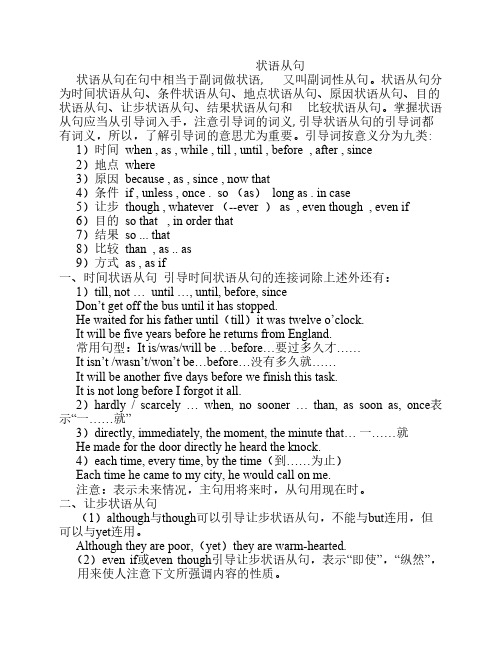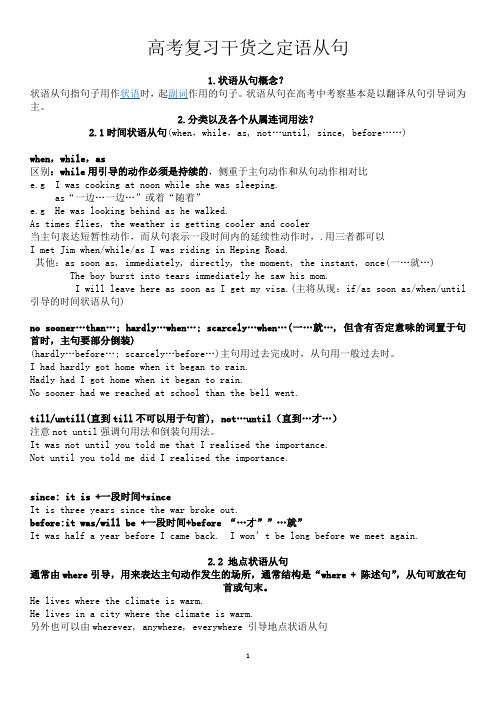高中英语状语从句讲解及练习
状语及状语从句(语法加练习完整讲解)

结果状语从句
The problem is so difficult that it will take us time to work it out. 这道题如此难以至于我们要用很多时间才能解决。
She is such a kind girl that everyone likes her. 她非常善良,以至于每个人都喜欢她。
not that...but that...(不是因为...而是因为)
条件状语从句
If you want to succeed, you'd better work hard. 如果你想成功,最好努力工作。 I'll come unless it rains. 除非下雨,否则我一定来。 You can borrow the book as long as you promise to keep i Ming studied so hard that he caught up with the others very quickly. 李明学习如此努力,结果很快赶上了其他人。
6.程度状语: I nearly forgot what he had promised. 我几乎忘记了他答应的事。
(2)如果动词前有一个或几个助动词,状语位于第一个 助动词之后。 He has already had his lunch.他已吃过午饭了。
(3)如果动词是be,状语就放在be动词之后。 He is always at home. 他总是在家。
3.状语位于句末,这是状语的通常位置。
We get up at six in the morning. 我们早晨六点起床。
三、状语的分类:
状语按用途可分为:地点、时间、原因、目的、 结果、条件、让步、程度、方式、伴随情况等几类。
高中英语状语从句讲解与练习

高中英语状语从句讲解与练习高中英语状语从句一、时间状语从句1、when的用法(1)when既可引导一个持续性动作,也可引导一个短暂性动作,可用于表示主句和从句动作同时发生或从句动作先于主句动作,有时还可表示从句动作后于主句,意为“当……时候”。
(2)when在beabouttodo……when……,bedoing……when……,haddone……when……,beonone’sway……when……,beonthepointofdoing…when……等结构中作“那时突然”讲。
(3)when“既然、鉴于;尽管,虽然(位于主句之后);如果”2、while的用法(1)则表示“当……时候”,鼓励的动作必须就是延续性的。
(2)用做同列连词,则表示相对关系“然而”。
(3)引导让步状语从句,相当于although,意为“虽然”,位于主句前。
(4)引导条件状语从句,相当于as/solongas,意为“只要”。
3、as的用法(1)则表示“当……时候”,特别强调同时出现,不所指先后。
(2)说明两种正在发展或变化的情况,表示“随着”,表示时间的推移。
(3)表示“一边……一边……”(4)强调两个动作紧接着发生。
(5)表示“虽然,尽管”(6)其他含义“正像,正如”,“做为”,“由于,因为”。
4、before的用法(1)一般意为“在……之前”“……才”,“……就”“还没有……”“免得”“不知不觉”“宁可,宁愿”,“否则,要不然”。
(2)itwillbe/was时间段before通常现在时/通常过去时。
在肯定句中,意为“多长时间之后才”;在否定句中,意为“用没法多长时间就”。
5、until和till(1)与肯定句连用,必须是延续性动词。
(2)与否定句属格,必须不为延续性动词,则表示“直至……才,在……之前不……”。
特别注意:notuntil可以用作特别强调句和倒装句强调句:itis/wasnotuntil…that…倒装句:notuntil放句首时,主句要部分倒装。
高中英语状语从句讲解及配 套练习

状语从句状语从句在句中相当于副词做状语, 又叫副词性从句。
状语从句分为时间状语从句、条件状语从句、地点状语从句、原因状语从句、目的状语从句、让步状语从句、结果状语从句和 比较状语从句。
掌握状语从句应当从引导词入手,注意引导词的词义,引导状语从句的引导词都有词义,所以,了解引导词的意思尤为重要。
引导词按意义分为九类: 1)时间 when , as , while , till , until , before , after , since2)地点 where3)原因 because , as , since , now that4)条件 if , unless , once . so (as) long as . in case5)让步 though , whatever (--ever ) as , even though , even if6)目的 so that , in order that7)结果 so ... that8)比较 than , as .. as9)方式 as , as if一、时间状语从句引导时间状语从句的连接词除上述外还有:1)till, not … until …, until, before, sinceDon’t get off the bus until it has stopped.He waited for his father until(till)it was twelve o’clock.It will be five years before he returns from England.常用句型:It is/was/will be …before…要过多久才……It isn’t /wasn’t/won’t be…before…没有多久就……It will be another five days before we finish this task.It is not long before I forgot it all.2)hardly / scarcely … when, no sooner … than, as soon as, once表示“一……就”3)directly, immediately, the moment, the minute that… 一……就He made for the door directly he heard the knock.4)each time, every time, by the time(到……为止)Each time he came to my city, he would call on me.注意:表示未来情况,主句用将来时,从句用现在时。
状语从句 讲解及练习

状语从句状语从句在句中作状语,修饰动词、形容词或副词等。
状语从句有九种,可以用来表示时间、条件、原因、地点、目的、结果、让步、方式、比较等意义。
一、状语从句的连接词。
⑴时间状语从句①连接词: when, while, as, as soon as, since, until, after, before, whenever②例句: I want to see him as soon as he arrives.Whenever he comes, he brings a friend.⑵条件状语从句①连接词: if, unless, as long as(只要)②例句: Unless you study harder you will never pass the examination.As long as I am alive, I will go on studying.⑶原因状语从句①连接词: as, because, since②例句: As the rain had stopped, we went on working.Since we live near the sea, we enjoy a healthy climate.⑷地点状语从句①连接词: where (在…的地方)②例句: Where there is smoke, there is fire.Put it where we can all see it.⑸目的状语从句①连接词: so that, in order that②例句: Finish this so that you can start another.He set out early in order that he might arrive in time.⑹结果状语从句①连接词: so that, so…that, such…that②例句: The bus broke down, so that we had to walk.He was so angry that he couldn’t speak.He is such a good teacher that we all love him.⑺让步状语从句①连接词: though, although, even if, however②例句: Although/Though he is in poor health, he works hard.Even if it rains cats and dogs, I’ll go.⑻方式状语从句①连接词: as, as if②例句: He does as the doctor advises.I will do it as you tell me.⑼比较状语从句①连接词: than, as…as, not so…as, the more…the more②例句: The work is not as easy as I thought.Actions speak louder than words.The more I look at the picture, the better I like it.二、易混连接词区分。
高三英语一轮复习状语从句讲义以及练习题(高考总复习,纯干货,原创)

1.状语从句概念?状语从句指句子用作状语时,起副词作用的句子。
状语从句在高考中考察基本是以翻译从句引导词为主。
2.分类以及各个从属连词用法?2.1时间状语从句(when,while,as, no t…until, since,before……)when,while,as区别:while用引导的动作必须是持续的,侧重于主句动作和从句动作相对比e.g I was cooking at noon while she was sleeping.as“一边…一边…”或着“随着”e.g He was looking behind as he walked.As times flies, the weather is getting cooler and cooler当主句表达短暂性动作,而从句表示一段时间内的延续性动作时,.用三者都可以I met Jim when/while/as I was riding in Heping Road.其他:as soon as, immediately, directly, the moment, the instant, once(一…就…)The boy burst into tears immediately he saw his mom.I will leave here as soon as I get my visa.(主将从现:if/as soon as/when/until 引导的时间状语从句)no sooner…than…; hardly…when…; scarcely…when…(一…就…, 但含有否定意味的词置于句首时,主句要部分倒装)(hardly…before…; scarcely…before…)主句用过去完成时,从句用一般过去时。
I had hardly got home when it began to rain.Hadly had I got home when it began to rain.No sooner had we reached at school than the bell went.till/untill(直到till不可以用于句首), not…until(直到…才…)注意not until强调句用法和倒装句用法。
状语从句课件讲解和练习

2 on / upon doing / on upon one’s +n
On arriving at the station, the thief was arrested. On his arrival in Paris, he was recognized as a famous person.
1 as 引导的让步从句要倒装,句型为: 形容词/ 副词/ 名词 不带冠词 / 动词 原形 +主语+谓语 Young as he is, he knows a lot. Much as I like it, I can’t afford it. Farmer as he is, he is well-educated. Try as I might, I couldn’t lift the stone. 2 although不倒装, though可倒装也可不 倒装, as 必须倒装
We didn’t go home _____ we finished the work. A. since B. until C. because D. though
It was not ______ she took off her dark glasses ______ I realized she was a famous film star. A. when; that B. until; that C. until; when D. when; then
另外, when/while还作并列连词,连接并列分句, while表示 “而,可是”如: I like reading while my wife enjoys watching TV. when表示 “就在这时” 在下列结构中,表示某 件事正在发生或刚刚发生,另一动作同时发生。
高中英语状语从句讲解及练习
状语从句在复合句中作状语,位置灵活。
状语从句可分为时间状语从句,目的状语从句,条件状语从句,让步状语从句,地点状语从句,原因状语从句,方式状语从句,结果状语从句。
(一)时间状语从句1.when,as,whilea.when表时间,从句既可以用延续性动词,又可以用瞬间动词。
Eg:WhenIgetthereIwillcallyou.如果when引导的时状的主语与主句的主语相同,而从句的谓语又是be动词时,那么从句中的主语与be可省。
Eg:When(youare)introuble,youcanaskherforhelp.如果when引导的时状的主语与主句的主语相同时,往往可以用“when+分词”的形式代替该状从。
Eg:WhenIcameintotheroom(Whencomingintotheroom),Ifoundthelightwasoff.b.while表时间,从句需用延续性动词,或者主句的动作发生在从句的动作进行过程中。
主句的谓语动词通常是非延续性动词。
Eg:HecameinwhileIwasreadingabook.ImetherwhileIwasinschool.c.as表时间,与when相似,但侧重强调主从句动作同在时间点或同时间段进行。
同时可表示主句的动作随着从句的动作的变化而变化。
Eg:Hejumpsashesings.Asthewindrose,thenoiseincreased.2.before(在……之前)与after(在……之后)Eg:Seemebeforeyouleave.IsawthemafterIarrived.3.till与until肯定形式表示的意思是"做某事直至某时"。
否定形式表达的意思是"直至某时才做某事"。
Eg:Waittill/untillIcallyou.等着直到我叫你。
Shedidn'tarrivetill/until6o'clock..她直到6点才到但是置于句首时只可用untill.Untilyoutoldme,Ihadheardnothingofwhathappened.直到你告诉我以前,出了什么事我一点也不知道。
状语及状语从句(语法加练习完整讲解).ppt
4.动词不定式(或不定式短语): He went to see a film .他看电影去了。 My father was surprised to hear the news . 我父亲听到这个消息,感到惊奇。
5.分词(短语): He sat there reading a novel . 他坐在那儿看小说。 The students went away laughing. 学生们笑着走开了。
2023最新整理收集 do something
The Adverbial 状语
ห้องสมุดไป่ตู้ 一、什么是状语
修饰动词、形容词 、副词或整个句子 ,说明 动作或 状态特征的句子成分,叫做 状语。
1. 状语修饰动词 Silently she went away. 她悄悄地走开了。
2. 状语修饰句子 Sadly, he will not be there. 令人伤心的是,他将不会在那里了。
The Adverbial Clauses 状语从句
从状种九
时间状语从句 地点状语从句 原因状语从句 条件状语从句 让步状语从句 结果状语从句 目的状语从句 方式状语从句 比较状语从句
时间状语从句
I will discuss this with you when we meet. 我们见面时再与你讨论这件事。
(2)如果动词前有一个或几个助动词,状语位于第一个 助动词之后。 He has already had his lunch .他已吃过午饭了。
(3)如果动词是 be,状语就放在 be动词之后。 He is always at home. 他总是在家。
3.状语位于句末,这是状语的通常位置。 We get up at six in the morning . 我们早晨六点起床。
高中英语状语从句用法解析(含练习和答案)
高中英语状语从句用法解析英语语法状语从句类型综述状语从句主要用来修饰主句或主句的谓语。
一般可分为九大类,分别表示时间、地点、原因、目的、结果、条件、让步、比较和方式。
尽管种类较多,但由于状语从句与汉语结构和用法相似,所以理解和掌握它并不难。
状语从句的关键是要掌握引导不同状语从句的常用连接词和特殊的连接词即考点。
现分别列举如下:1.时间状语从句常用引导词:when, as, while, as soon as, while, before, after, since , till, until特殊引导词:the minute, the moment, the second, every time, the day,the instant, immediately , directly, no sooner … than, hardly …when, scarcely … whenI didn’t realize how special my mother was until I became an adult.While John was watching TV, his wife was cooking.The children ran away from the orchard(果园) the moment they saw the guard.No sooner had I arrived home than it began to rain.Every time I listen to your advice, I get into trouble.2.地点状语从句常用引导词:where特殊引导词:wherever, anywhere, everywhereGenerally, air will be heavily polluted where there are factories.Wherever you go, you should work hard.3.原因状语从句常用引导词:because, since, as, since特殊引导词:seeing that, now that, in that, considering that, given that, considering that, inasmuch as, insomuch asMy friends dislike me because I’m handsome and successful.Now that everybody has come, let’s begin our conference.The higher income tax is harmful in that it may discourage people from trying to earn more.Considering that he is no more than 12 years old, his height of 1.80 m is quite remarkable.4.目的状语从句常用引导词:so that, in order that特殊引导词:lest, in case, for fear that,in the hope that, for the purpose that, to the end thatThe boss asked the secretary to hurry up with the letters so that he could sign them.The teacher raised his voice on purpose that the students in the back could hear more clearly.5.结果状语从句常用引导词:so … that, so… that, such … that,特殊引导词:such that, to the degree that, to the extent that, to such a degree that,He got up so early that he caught the first bus.It’s such a good chance that we must not miss it.To such an degree was he excited that he couldn’t sleep last night.6.条件状语从句常用引导词:if, unless,特殊引导词:as/so long as, only if, providing/provided that, suppose that, in case that, on condition thatWe’ll start our project if the president agrees.You will certainly succeed so long as you keep on trying.Provided that there is no opposition, we shall hold the meeting here.7.让步状语从句常用引导词:though, although, even if, even though特殊引导词:as(用在让步状语从句中必须要倒装),while ( 一般用在句首),no matter …,in spite of the fact that, while, whatever, whoever, wherever, whenever, however, whicheverMu ch as I respect him, I can’t agree to his proposal.尽管我很尊敬他,我却不同意他的建议。
高考状语从句讲解和练习题
⾼考状语从句讲解和练习题定义——在复合句中由从句表⽰的状语称作状语从句,状语从句由从属连词引导,也可以由⼀个起连词作⽤的词组引导,有时甚⾄不需要连词⽽直接和主句连接起来。
类型——时间、地点、原因、结果、条件、⽬的、让步、⽅式、⽐较状语从句。
1.引导词when, while, as, as soon as, once, before, after, every time, each time, since, whenever, ever since, until ,till等。
2.whenever, each time, every time的⽤法。
注:whenever=no matter whenevery time / each time 每次,whenever 每当······时,表⽰习惯性、经常性的动作。
Whenever we met with difficulties, they came to help us.Each time he came to town he would visit our school.Eevery time I went to his house, he was out.注:whenever=no matter whenwhenever既可以引导时间从句也可引导名词性从句,no matter when只可以引导时间状语从句。
It does not matter whenever the party begins.3.before的汉英表达1)before的基本含义是“在·····以前”The train had left before he got to the station.注意:与before对应的是after引导的时间状语从句,表“在·····之后”。
- 1、下载文档前请自行甄别文档内容的完整性,平台不提供额外的编辑、内容补充、找答案等附加服务。
- 2、"仅部分预览"的文档,不可在线预览部分如存在完整性等问题,可反馈申请退款(可完整预览的文档不适用该条件!)。
- 3、如文档侵犯您的权益,请联系客服反馈,我们会尽快为您处理(人工客服工作时间:9:00-18:30)。
状语从句在复合句中作状语,位置灵活。
状语从句可分为时间状语从句,目的状语从句,条件状语从句,让步状语从句,地点状语从句,原因状语从句,方式状语从句,结果状语从句。
(一)时间状语从句1.when, as, whilea.when表时间,从句既可以用延续性动词,又可以用瞬间动词。
Eg: When I get there I will call you.如果when引导的时状的主语与主句的主语相同,而从句的谓语又是be动词时,那么从句中的主语与be 可省。
Eg:When (you are)in trouble, you can ask her for help.如果when引导的时状的主语与主句的主语相同时,往往可以用“when+分词”的形式代替该状从。
Eg:When I came into the room(When coming into the room), I found the light was off.b.while表时间,从句需用延续性动词,或者主句的动作发生在从句的动作进行过程中。
主句的谓语动词通常是非延续性动词。
Eg: He came in while I was reading a book.I met her while I was in school.c. as表时间,与when相似,但侧重强调主从句动作同在时间点或同时间段进行。
同时可表示主句的动作随着从句的动作的变化而变化。
Eg: He jumps as he sings.As the wind rose, the noise increased.2.before(在……之前)与after(在……之后)Eg:See me before you leave.I saw them after I arrived.3. till与until肯定形式表示的意思是"做某事直至某时"。
否定形式表达的意思是"直至某时才做某事"。
Eg: Wait till/untill I call you.等着直到我叫你。
She didn't arrive till/until 6 o'clock..她直到6点才到但是置于句首时只可用untill.Until you told me, I had heard nothing of what happened. 直到你告诉我以前,出了什么事我一点也不知道。
否定形式有另外两种表达方式:(1)Not until …在句首,主句用倒装。
Man did not know what heat was until the early years of the 19th century.=Not until the early years of the 19th century did man know what heat was.(2)It is not until…that…He will not go to bed until his mother comes home.=It is not until his mother comes home that he will go to bed.4. as soon as/the moment/the instant/the second/the minute/immediately和hardly/scarcely…when, no sooner…thana. as soon as/the moment/the instant/the second/the minute/immediately 表示主句和从句的动作同时发生。
译为“一……就”Eg:As soon as she heard the news, she began crying.b. hardly/scarcely…when, no sooner…than都可以表示"一……就……"的意思,但主句谓语动词一般要用过去完成时,从句谓语动词要用一般过去时。
Eg:I had hardly / scarcely got home when it began to rain.I had no sooner got home than it began to rain.注意:如果hardly, scarcely 或no sooner置于句首,句子必须用倒装结构:Hardly / Scarcely had I got home when it began to rain.No sooner had I got home than it began to rain。
1. We called the First - Aid Center_______ the traffic accident happened.A. immediatelyB. shortlyC.quicklyD. hurriedly2. The roof fell _____he had time to dash into the room to save his baby.A. beforeB. asC. afterD. until3. A good storyteller must be able to hold his listeners’ curiosity he reaches the end of the story.A whenB whenever C.after D.until4. I had just started back for the house to change my clothes _______ I heard the voices.A. asB. forC. whileD.when5. ______ the day went on, the weather got worse.1A. WithB. SinceC. WhileD. As(二)目的状语从句1. (so) that/in order that(so)that/in order that表示“为了,以便”,引导的目的状语从句要用虚拟语气。
Eg: He shouted at the top of his voice so that/in order that he might be heard.如果表示“为了,以便”的目的状语从句的主语与主句的主语相同,可用in order to或so as to替代。
Eg:I came early so as to/in order to catch the first train.3.lest, for fear that, in caselest, for fear that, in case表示“以免,以防”。
其中lest, for fear that要用(should)+动词原形的虚拟语气;in case 后的从句可用虚拟语气,也可用陈述语气。
Eg:I will not make a noise lest/ for fear that I (should) disturb you.Take your umbrella in case it rains.Ex.1. He whispered to his wife_______ he might wake up the sleeping baby.A. so thatB. on condition thatC. for fear thatD. so long as2. Roses need special care they can live through winter.A. because B so that C even if D as3. Leave your key with a neighbour you lock yourself out oneday.A ever sinceB even ifC soon afterD in case4. Take your umbrella with you ____________ it rains.A. ifB. as ifC. in caseD. as long as5. I hurried _____ I wouldn’t be late for class.A. sinceB. so thatC. as ifD. unless(三)条件状语从句1. if: “如果”(如为真实条件句用陈述语气、如为非真实条件句用虚拟语气)Eg: If it snows tomorrow, the flight will be canceled.If I were a bird, I would fly.2. in case, on condition that, provinding, provided (that), supposing, supposed (that) :“假如,在……条件下”Eg: The mother promises to the son to buy him a toy airplane on condition that he passes his English test. Suppose (that) he does not come, what shall we do?3. unless:“除非”(=if not)Eg: We can’t get there on time unless we book the ear liest flight= We cannot get there on time if we don’t book the earliest flight.4.as/so long as:“只要”Eg: We will succeed as long as we keep on trying.Ex1. --What are you going to do this afternoon?--I’ll probably go for a walk later on ___ it stays fine.A. as far asB. so long asC. even ifD. as if2. We will have a picnic in the park this Sunday it rains.A sinceB ifC unlessD until3. You will pass the exam you work hard.A unlessB even ifC as ifD if(四)让步状语从句1. “虽然,即使,尽管”a. although/ though/ even though/ even ifalthough/ though 语气较弱(尽管),even though/ even if(即使)语气较强。
